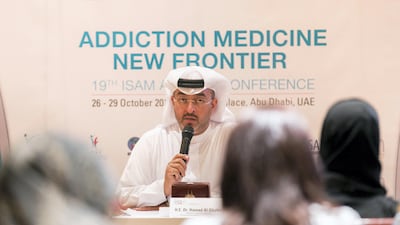After battling addiction for decades, Salem Al Muhairi has finally recovered and picked up the pieces of his life – starting with a daily job that will bring him a stable income.
He began taking drugs in 1985, when out of “teenage curiosity” he started smoking hashish only to eventually become addicted to a cocktail of drugs including heroin.
“I call it the world of loss and darkness,” said the 51-year-old Emirati.
“I was employed at 17, and my matters were well, until I got into drugs.”
During the first decade of his drug use, neither he nor his family were aware that the troubles he was having were due to addiction, he did not even recognise himself as an addict.
“At first they would check me into hospitals, one after the other, but nothing was effective,” said Mr Al Muhairi.
“Then they thought I was under black magic, so they got me experts to try to undo it, and gave me special water to drink from.”
It wasn’t until he was arrested for consuming drugs in the late 90s that he came to terms with his addiction.
After a spate of stints in prison and unsuccessful treatments, Mr Al Muhairi decided to start a business in electronics and maintenance and attempted to wean himself off drugs using alcohol.
“So I thought I will quit drugs and consume alcohol instead… but then I discovered that alcohol brings you back to drugs eventually.”
He ran into further trouble and was imprisoned again in. “But after my release the last time, I decided I have to leave this life behind me and get a fresh start.”
He checked himself into the National Rehabilitation Centre on June 8, and is now completely clean.
Mr Al Muhairi, is one of six recovered addicts who will benefit from an agreement signed on Monday between the NRC and Sahl, an Easy Business Services Centre that provides jobs for Emiratis. Under the agreement, Sahl will recruit recovered addicts and pay them monthly salaries. They will be working in data entry, at a centre that was set up at the NRC itself, where they can train and operate.
“This is the first time such a project takes place between us and the private sector; this place is dedicated to you at the NRC, and at the same time will provide you with a stable income,” Dr Hamad Al Ghaferi, director general of the NRC, told Mr Al Muhairi and his peers after signing the agreement.
“As long as you work and produce, this small room will grow bigger in the future,” he said.
“This is a message to all of us and to other addicts and society, that an addict is a patient and he can recover and produce if he finds support,” said Khalid Ali, who will be joining the Sahl as well.
After 17 years of addiction, Mr Ali decided to quit drugs after a friend of his died of an overdose. “I got him into it, so I felt it was my responsibility that he died,” he said.
“I grew tired of addiction, and many people around me died, so I did not want to die and then my mother gets criticism from society about my failure,” said the 38-year-old.
He checked himself into the NRC on Oct 28, 2014, and since then he not only recovered from his addiction, but he also finished a bachelor’s degree in HR at the University of Worcester, and has gotten married.
He is also due to finish his MBA in April, “if it works out financially.”
He said with the new stable job, he would be able to pay the Dh24,000 for his graduation project.
Dr Ali Al Marzouqi, head of public health and research department at the NRC, said treating addiction has always been the easy part, but finding a suitable environment for the patient to produce was the real challenge.
“So we decided to cooperate with Sahl to provide jobs within conditions, so it is based here and under our supervision and a safe working environment for them,” Mr Al Marzooqi said.
“Once he (the addict) finished treatment, he finds a job, so this helps prevent setbacks.”
For the pilot period, six patients will be training and working with Sahl, and once it proves its success, they will expand to include more numbers.
“There was a lot of enthusiasm from the patients of course because this is a big opportunity for them,” he said.
Ahmed Al Rumaithi, chief executive of Sahl, said they were encouraged to take this step after seeing the great confidence the NRC had in selected patients.
“Because this is not just an initiative that includes computers and tools, but Dr Hamad has trust in these men, and he said ‘I will choose a group that could give me a successful result.”


